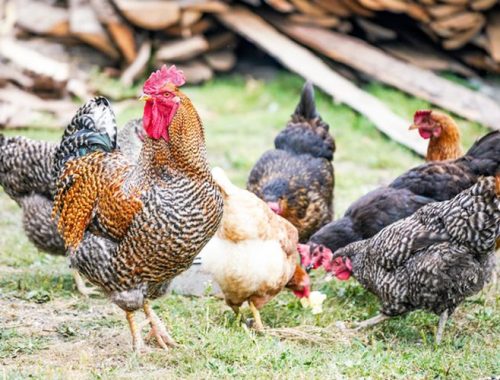Detecting and Preventing Common Chicken Diseases: Ensuring the Well-being of Your Flock
Introduction
As chicken enthusiasts, we take great pride in caring for our feathered friends. However, just like any living creature, chickens are susceptible to diseases that can hinder their health and productivity. Therefore, it is crucial to be vigilant and informed about common chicken diseases to ensure the overall well-being of your flock. In this article, we will explore various diseases that commonly affect chickens and discuss essential preventive measures you can take to keep your beloved chickens happy and healthy.
Understanding Common Chicken Diseases
-
Infectious Bronchitis (IB): This highly contagious viral respiratory disease affects chickens of all ages. Infected chickens experience respiratory distress, cough, nasal discharge, and reduced egg production. Some infected hens may even lay eggs of poor quality or with thin shells. Timely vaccinations are the key to preventing the spread of IB within your flock.
-
Marek’s Disease: A viral illness that primarily affects young chickens, Marek’s disease weakens the immune system, leading to tumors in nerves and organs. Symptoms include paralysis, loss of muscle control, weight loss, and poor feathering. Vaccination at an early age plays a vital role in preventing Marek’s disease.
-
Coccidiosis: This highly prevalent parasitic disease specifically targets the digestive tract of chickens. Symptoms typically include diarrhea, dehydration, weight loss, and reduced egg production. Maintaining clean coop conditions, regular deworming, and providing a balanced diet are crucial in the prevention of Coccidiosis.
-
Avian Influenza (AI): Also known as bird flu, AI is a viral disease that can infect both wild birds and domestic poultry, including chickens. Symptoms include respiratory distress, swelling of the head and neck, reduced egg production, and even death. Preventive measures such as biosecurity protocols and quarantine of new birds are vital to avoid an AI outbreak.
Preventive Measures to Safeguard Your Flock
-
Biosecurity Practices: Implementing strict biosecurity measures helps prevent the introduction and spread of diseases. This includes limiting visitors to your coop, maintaining a clean environment, disinfecting equipment, and having separate footwear for the coop area. Be mindful of wild birds, as they can transmit diseases to your flock.
-
Vaccination: Consult with a veterinarian to develop a vaccination schedule suitable for your flock. Vaccinations are available for various diseases like IB, Marek’s disease, and Newcastle disease. Administering vaccines at the recommended ages will significantly enhance your chickens’ resistance to infections.
-
Proper Nutrition: Providing a high-quality, balanced diet is essential for maintaining your chickens’ immune system. Ensure they have access to feed that meets their specific nutritional requirements. Keep their water clean and readily available, as dehydration weakens their immune response.
-
Regular Health Checks: Observing your chickens regularly allows you to detect any signs of illness promptly. Monitor their behavior, appetite, and egg production. Isolate any sick birds and seek veterinary advice to prevent the spread of diseases.
Conclusion
Maintaining the health of your flock relies heavily on proactive and preventive measures. Regular vaccinations, good biosecurity practices, proper nutrition, and vigilant health checks all contribute to safeguarding your chickens from common diseases. By being proactive in disease prevention and promptly addressing any health concerns, you can create a safe and healthy environment for your feathered companions.
FAQs (Frequently Asked Questions)
1. Can I vaccinate my chickens myself?
While some vaccines are available for home administration, it is often recommended to seek professional veterinary advice. A veterinarian can guide you regarding the specific vaccines required for your chicken breed and administer them safely.
2. How can I implement effective biosecurity practices?
To ensure effective biosecurity, limit access to your coop, use separate footwear for the coop area, and regularly clean and disinfect equipment. Regularly monitor incoming birds for signs of illness and keep your coop secure from wild birds.
3. What should I feed my chickens to prevent diseases?
A balanced diet is crucial for preventing diseases. Feed your chickens a commercial poultry feed that is appropriate for their age and breed. Supplement their diet with fresh fruits, vegetables, and occasional treats like mealworms.
4. Can I use natural remedies to treat chicken diseases?
Natural remedies may be used as supportive therapy in certain cases, but it is essential to consult a veterinarian for an accurate diagnosis and appropriate treatment. Some natural remedies may interact with conventional medications and affect their efficacy.
5. How often should I conduct health checks on my flock?
Regular health checks should be conducted at least once a week. Monitor your chickens’ behavior, appetite, egg production, and overall appearance. Early detection of any health issues can prevent significant outbreaks and provide effective treatment options.
Remember, the health and well-being of your chickens rely on your dedication and care. By implementing preventive measures and promptly addressing any health concerns, you can ensure a healthy, thriving flock!
Note: This article is intended to provide general information on common chicken diseases. It is not a substitute for professional veterinary advice. If you have specific concerns about your chickens’ health, please consult a qualified veterinarian.
References:
– Chicken Diseases: Prevention and Control
– Common Chicken Diseases
You May Also Like

Designing for Discovery: The Latest Trends in Modern Laboratory Architecture
February 13, 2023
PROGRAM SANTAI BICARA AYAM KAMPUNG
October 4, 2021

